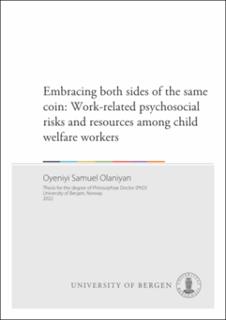| dc.description.abstract | Background: Child welfare workers (CWW) have lately been facing constant criticism for their decisions, the failure to act in time, and generally for the nature and quality of their services. While the validity of most of these criticisms is disputable, such discussions usually pay less attention to the work environment among CWW, the constant work pressure, and the huge demanding workload that these workers usually deal with daily. CWW are mainly tasked with helping families with children in dire need. However, these tasks are diverse and involve investigating and stopping maltreatment of children, reducing and curbing negligence, eradicating child abuse, limiting violence to children and children witnessing violence carried out by their parents, and periodic financial support to children and families with children. Although some scholars have called for appraising service quality and practice, it can be argued that such evaluations should include the work environment and the well-being of workers. The nature of the work and the characteristics of some of the work-related psychosocial risks that CWW deal with have brought many scholars to the conclusion that child welfare services (CWS), especially those working on the frontline, have the most complex work environment within the field of human services. Moreover, there is a prevalent tendency that studies focus solely on negative workplace experiences among CWW. Crucial questions concerning how work pressures affect CWW outside of the work domain, the importance of workplace resources like a supporting work environment, and the impact of individual capacities and resources are seldom investigated in the field.
Purpose: This project explores some of the crucial but often disregarded areas in the CWW literature. Based on the Job Demand Resource (JD-R) model, as well as other relevant organizational theories such as workability, person-environment fit, role strain theory, and positive organizational scholarship (POS), the main question guiding this project is: How does the exposure to work-related psychosocial risks and workplace resources affect CWW at work and outside the boundaries of work? This overarching question was further sub-divided into three separate questions that were addressed in three studies: (1) How does support help CWW cope with the exposures to work-related psychosocial risks? (2) How do CWW experience balancing work and family life, and what are the spill-over effects of work to family and vice versa? (3) How do CWW deal with workplace risks and what are the individual capacities/strategies they employ that allow them to get through the day?
Methods: Study 1 employed a scoping review method to explore the importance of workplace support in helping CWW deal with the constant work pressure they faced. Studies were gathered from searches in PsycINFO, MEDLINE, ProQuest, and the Web of Science. Fifty-five studies were included in this review. Studies 2 and 3 are based on qualitative designs and empirical data were collected through semi-structured interviews from CWW across various cities in Norway. The sample for the qualitative studies is sixteen CWW with at least three years of experience in the field. All data (including the scoping review data) were analyzed using thematic analysis.
Findings: In Study 1, included studies framed workplace support such as organizational support, colleagues/collegiate support, peer support, social support, administrative support, coworker support, supervisor support, perceived agency support, emotional support, and perceived organizational support. These descriptive frames of workplace support were thematized and categorized into three overarching categories: (1) co-worker/peer support, (2) social/organizational/management support, and (3) supervisor or leadership support. Additionally, findings show that the perception of support is positively related to workplace factors such as job satisfaction, organizational commitment, and balance between the work and home domains. In contrast to the above, workplace support was also found to have a negative relationship with crucial work-related psychosocial risk variables like job stress, burnout, secondary traumatic stress (STS), and turnover. In Study 2, four themes emerged when CWW described how their work influences their private lives: (1) “it goes both ways”, (2) work as self-identity, (3) spill-over effects, and (4) “on the lookout”. Findings are in line with one of the core arguments of role strain theory i.e., when the resources available to a worker stays the same, an increase in demand from one domain will likely result in an imbalance/conflict in another domain. In Study 3, five themes emerged: (1) showing commitment and going the extra mile, (2) viewing challenge as opportunities for learning and growth, (3) confidence and efficacy beliefs, (4) conscious control of work behavior, and (5) prioritizing. Drawing on POS, Study 3 showed the importance of building and encouraging individual capacities among work group members.
Conclusion: Past research has often focused on the negative aspects of the work environment among CWW. While this practice is understandable, approaching work environment issues from the two sides (that is, negative and positive) will broaden existing knowledge of the work situation of CWW. It will also provide an empirical basis for initiating targeted interventions for CWW. Although there have been calls for evaluating and improving service quality and practices within the CWS, such effort can be successful only if they include negative and positive issues within the work environment. | en_US |
| dc.relation.haspart | Paper 1: Olaniyan, O. S., Hetland, H., Hystad, S. W., Iversen, A. C., & Ortiz-Barreda, G. (2020). Lean on me: A scoping review of the essence of workplace support among child welfare workers. Frontiers in Psychology, 11, 287. The article is available at: <a href="https://hdl.handle.net/11250/2766369" target="blank">https://hdl.handle.net/11250/2766369</a> | en_US |
| dc.relation.haspart | Paper 2: Olaniyan, O. S., Iversen, A. C., Ortiz-Barreda, G., & Hetland, H. (2022). When your source of livelihood also becomes the source of your discomfort: The perception of work– family conflict among child welfare workers. European Journal of Social Work, 25(3), 418-429. The article is available at: <a href="https://hdl.handle.net/11250/2831820" target="blank">https://hdl.handle.net/11250/2831820</a> | en_US |
